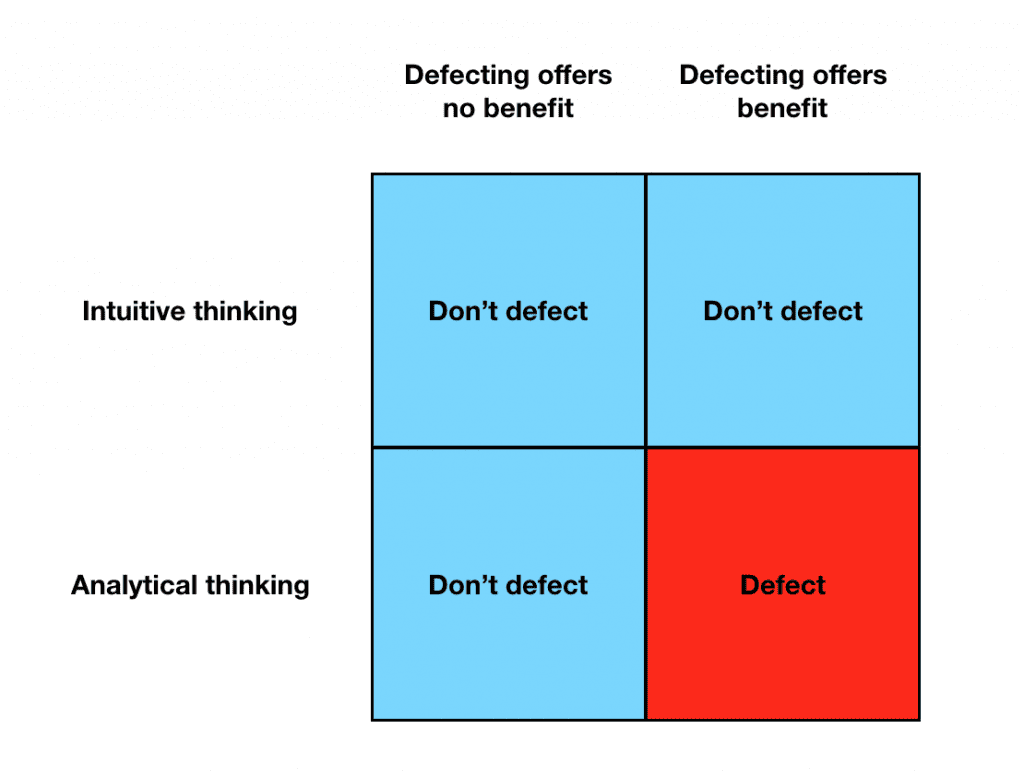You’re at a wedding. The officiant concludes the homily with a prayer, and most of the assembled guests bow their heads respectfully. But you don’t see “God” anywhere – there’s no spirit visibly hovering over the pews, no bright light, no booming voice. If you think critically about it, picking apart the minister’s every word, you might conclude that this whole God business is a prank. But if you just “go with the flow,” bowing your head because everyone else is, you might just accept the theistic claims without noticing it. This scenario illustrates an important finding: analytical or reflective cognitive style seems to be inversely correlated with religious belief. Why? Two colleagues and I recently published a chapter in a new book that offers an unconventional answer: because analytical thinking is correlated with individualism, and where individualism is found, religion isn’t.
The colleagues in question are Jonathan Morgan, a PhD candidate at Boston University and the chapter’s first author, and Catherine Caldwell-Harris, a professor of psychological and brain sciences at BU. (Both Jonathan and Catherine are also affiliated with the independent Center for Mind and Culture, where I work.) The chapter appears in the recently published book The New Reflectionism in Cognitive Psychology: Why Reason Matters, edited by Gordon Pennycook, a postdoc at Yale who has published some of the most well-known research about how analytical thinking affects religious belief.
Pennycook’s work has contributed to a large – and growing – number of research studies that find that people who score higher on tests of analytical reasoning are less likely to be religious than intuitive thinkers. And while another extensive body of evidence ties lower IQ scores to religiosity, many of the tests used to measure IQ in these studies are skewed toward measuring analytical thinking, such as numerical ability and logical induction – rather than, say, verbal reasoning. (And yes, verbal reasoning is included in the general intelligence factor (g) that IQ tests are supposed to measure.) When analytical thinking scores are controlled for, the association between religiosity and intelligence often disappears. In short, analytical thinking really does seem to have a negative impact on religious belief – even more than general intelligence.
In dual-process theories of the mind, the intuitive or heuristic mode of thinking (System 1) is fast, automatic, and often a bit sloppy. It offers up your “gut” feeling when you encounter a new situation or a problem that needs solving. By contrast, analytical or reflective cognition (System 2) is slow, effortful, and incisive. You use analytical thinking to question your initial judgments or first responses, to pick things apart mentally, and to do careful logical reasoning.
Both forms of cognition are important. System 1 can deal with a lot of information at once, and helps you make quick, efficient decisions in areas that you intuitively understand well. Say a group of experienced boaters senses a change in the direction of the wind and a shift in the color of the light. It’s System 1 that gathers up these cues, leaps to a conclusion based on experience and instinct, and yips “Storm’s coming! Head to port!” But the gut instinct of less-experienced boaters might be completely off-base, misinterpreting perfectly innocent clouds as nasty storm threats, or – more dangerously – completely overlooking the signals that a truly gargantuan squall is bearing down. In other words, System 1 thinking is only reliable in situations where the brain has a lot of experience or evolutionary history to draw on. But when it is reliable, it can be a lifesaver (or at least a time- and hassle-saver).
Analytical, System 2 thinking is best in novel situations, or in contexts where your gut instinct might lead you astray. We use System 2 thinking to do mathematical proofs, to follow complex logical arguments, and to piece together evidence from an experiment. One mundane area where most people have to draw on their analytical thinking skills is budgeting and checkbook balancing – our gut intuitions about how much we spend, or how much things are likely to cost, are often wildly off-base. This is why budget spreadsheets help many people get control over their finances: despite being apocalyptically boring, they force people to think effortfully, precisely, and analytically about their specific expenditures and income, thereby circumventing their maladaptive, fuzzy intuitions.*
Okay, so why would religion be more associated with intuitive System 1 thinking than analytical System 2? The most common explanation is that, since we’re highly evolutionarily predisposed to sense agency or intentionality in the world, we see faces in the clouds, imagine ghosts in dark attics, and believe in invisible gods. According to this model, these predispositions to supernatural thinking are automatic and intuitive, so our default System 1 processes support them. It’s only when we activate our analytical thinking that we start to question these defaults – and voilà: supernatural thinking vanishes.
But Jonathan, Catherine, and I think that this explanation overlooks a crucial fact: intuitive and analytical thinking also are associated with collectivism and individualism, respectively. In our chapter, we call this factor “social density,” and we think it explains why religious beliefs are associated with holistic/intuitive cognitive style. By calling attention to social contexts, we highlight that cognitive style isn’t just a matter of individual differences – it’s also deeply shaped by our social, cultural, and even economic environment. Evidence shows that liberals are more analytical than conservatives; that nonbelievers are more analytical than believers; that Westerners are more analytical than East Asians (and pretty much everyone else); and that wheat farmers are more analytical than rice farmers. In each case, the more analytical group is more individualistic, more freedom-oriented, and less constrained by the need for social coordination.
Why would analytical thinking be associated with individualism? In our chapter, we offer two answers to this question. First, analytical thinking is inversely correlated with social cognition at the neurological level. When we activate our reflective, analytic, and logical thinking, the brain networks that power social interactions and that process social information go quiet. Analytical thinking is, essentially, impersonal thinking.
The second reason is because analytical thinking leads people to go their own way, by casting doubt on social conventions and norms. Quoting from the chapter:
an analytical cognitive style can be disadvantageous in a socially dense society. Analytical thinking encourages noting contradictions, including inspecting cultural teachings for self-relevance and questioning social mores.…A consequence of an analytical thinking style may thus be less…adherence to conventional norms and (less) cooperating with others in uncalculating ways.
Another Yale psychologist, David Rand, has explored this relationship between dual-process cognition and cooperation intensively. In a number of studies, Rand and his colleagues have found that effortful, analytical reflection encourages people to opportunistically defect on cooperative agreements. That is, when we think analytically, we tend to question social norms that encourage cooperation – if we might gain an advantage by breaking those norms. But when it’s advantageous to abide by the norms, then we’ll stick with them obediently. Rand calls this “strategic” cooperation. By contrast, intuitive thinkers abide by social expectations and norms regardless of whether it’ll pay off in the short term (“pure” cooperation). Here’s a decision matrix that illustrates this finding:
Of course, a social group where everyone cooperated only when it benefitted them in the short term – while defecting the rest of the time – wouldn’t be very functional. After all, the glue that holds social groups together is a shared expectation that most people will cooperate and abide by norms most of the time. In socially dense contexts, this expectation only becomes more important.
So where does religion fit in? We argue that religious beliefs are like social conventions or norms: they’re products of the human imagination that only stay “intact” if we don’t subject them to intensive criticism. If someone is sincere about his or her religious beliefs, then, that’s a good sign that he or she is also not too critical of social conventions, norms, and cooperative expectations. In other words, religious belief is a credible sign that a person will not be an opportunistic defector – precisely because it shows that the person probably has a fairly intuitive thinking style. As such, religion is more salient in socially dense environments, where people rely heavily on one another for cooperation and need to be able to predict one another’s behavior for coordination.
This doesn’t mean that religion makes people moral, by the way. It means that religious beliefs are a fairly reliable signal that the people holding them aren’t too critical of local social conventions or other social constructions. But remember that social conventions can be nasty things: in the antebellum American South, slaveholding was embedded in the way people saw the world. It was just…normal. As a result, religious leaders in the South commonly used religious beliefs as justification for slavery’s central role in the surrounding economy. In that case, the intuitive default was to accept the institution of slavery and to “cooperate” with the status quo. So religious people and intuitive thinkers may be more likely to be unthinking cooperators, but that’s not always a good thing. (Although in many cases it is a good thing, such as when religious norms encourage giving to charity and volunteering. Life is complicated.)
We conclude the chapter by making a few testable predictions. One prediction is that cognitive style and religiosity should be most highly correlated in cultures that are low in social density – like America or Western Europe. In regions like Turkey or Latin America, where social density is higher, there’s simply less freedom to reject cultural norms and religious beliefs. So in those places, even people who are inherently more analytically minded may tend to go along with the dominant religious beliefs. Another prediction is that priming people to think more holistically and intuitively ought to make them more prone to sacralizing important concepts or norms – that is, to construing them as inviolable and unquestionable. Put another way, we think holistic/intuitive thinking style is probably correlated with the tendency to put up a “do not touch” boundary around social constructs.
Among psychologists and cognitive scientists, the conversation about religion and cognitive style has mostly focused on the role that intuitive thinking plays in generating religious beliefs or insulating them from rational scrutiny. In our chapter, Jonathan, Catherine, and I try to make that conversation richer by pointing to the signaling function that religious beliefs and intuitive thinking styles have in social settings. The French sociologist Émile Durkheim said that religion was “eminently social.” While we can quibble about how flawed his theories were, it’s indisputably true that religion has a strong social component. Debates about cognitive style and religion have mostly overlooked that component, until now. You’re welcome.
____
I never told you what the chapter is title is. It’s “Reflective Thought, Religious Belief, and the Social Foundations Hypothesis.” You can learn more about the book here. Check out the review blurb by Steven Pinker!
____
* Another situation that calls for analytical thinking is driving in Boston as a non-local. Or driving in Boston, period. Or walking. Or any form of transportation. If you follow the gut intuitions that your brain has built up from years of getting around normal, decent cities – for example, that if you make three right-hand turns you’ll logically end up back on the same street where you started – you will end up in another dimension, and no one will ever see you again. So driving in Boston is an exercise in constantly stuffing your System 1 intuitions. It also serves fairly well as combat training.














